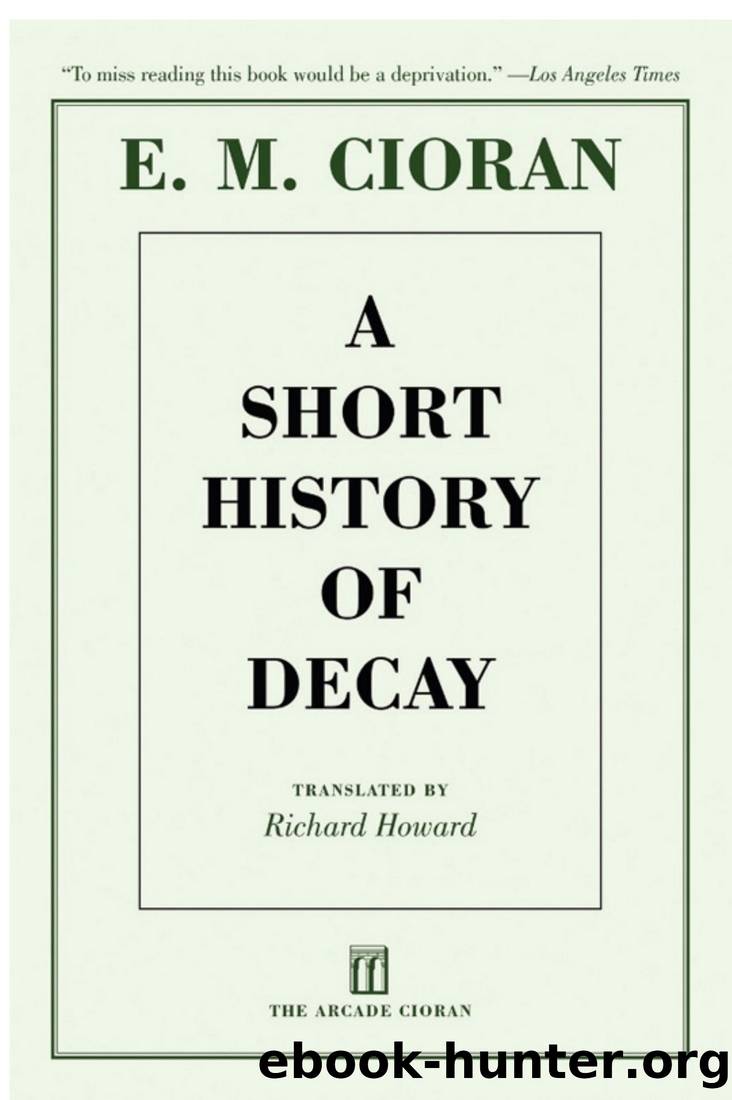A Short History of Decay by E.M. Cioran

Author:E.M. Cioran
Language: eng
Format: azw3
Tags: Modern, Reference, 20th Century, Philosophy, French, Literary Criticism, Social, History & Surveys, Quotations, Essays, European
ISBN: 9781628724943
Publisher: Arcade
Published: 2012-11-13T00:00:00+00:00
Conditions of Tragedy
If Jesus had ended his career upon the Cross, if he had not been committed to resuscitationâ-what a splendid tragic hero! His divine aspect has cost literature an admirable subject. Thereby he shares the fate, aesthetically mediocre, of all just men. Like everything which perpetuates itself in menâs hearts, like everything which is exposed to worship and does not irremediably die, he does not lend himself to that vision of a total end which marks out a tragic destiny. For that it would have been necessary that Jesus have no followers and that the transfiguration did not come to raise him to an illicit halo. Nothing more alien to tragedy than the notion of redemption, of salvation and immortality! The hero succumbs under the weight of his own actions, without its being granted him to evade his death by some supernatural grace; he continuesâas an existenceâin no way whatever, he remains distinct in menâs memory as a spectacle of suffering; having no disciples, his sterile destiny proves fruitful to nothing but other peopleâs imagination. Macbeth collapses without the hope of a redemption: there is no extreme unction in tragedy. . . .
The nature of a faith, even if it must fail, is to elude the Irreparable. (What could Shakespeare have done with a martyr?) The true hero fights and dies in the name of his destiny, and not in the name of a belief. His existence eliminates any notion of an escape; the paths which do not lead him to death are dead ends to him; he works at his âbiography"; he tends to his denouement and instinctively manages everything to bring about events fatal to himself Fatality being his vital juice, every way out can be no more than a disloyalty to his destruction. Thus the man of destiny is never converted to any belief whatever: he would thereby spoil his end. And, if he were immobilized on the cross, it is not he who would raise his eyes to heaven: his own history is his sole absolute, as his will to tragedy is his sole desire. . . .
Download
This site does not store any files on its server. We only index and link to content provided by other sites. Please contact the content providers to delete copyright contents if any and email us, we'll remove relevant links or contents immediately.
| Africa | Americas |
| Arctic & Antarctica | Asia |
| Australia & Oceania | Europe |
| Middle East | Russia |
| United States | World |
| Ancient Civilizations | Military |
| Historical Study & Educational Resources |
The Third Pole by Mark Synnott(676)
Money for Nothing by Thomas Levenson(624)
Christian Ethics by Wilkens Steve;(570)
The Economist (20210109) by calibre(563)
Made in China by Anna Qu(540)
100 Posters That Changed The World by Salter Colin T.;(498)
Reopening Muslim Minds by Mustafa Akyol(484)
Routledge Handbook of Contemporary India by Knut A. Jacobsen(476)
The Irish Buddhist by Alicia Turner(469)
Nonstate Warfare by Stephen Biddle(460)
Culture by Terry Eagleton(457)
The Great Pyramid Void Enigma by Scott Creighton(448)
The Age of Louis XIV: The Story of Civilization by Will Durant(434)
Ideology by Eagleton Terry;(432)
The Shortest History of China by Linda Jaivin(431)
Objects of Vision by Saab A. Joan;(425)
Banaras: CITY OF LIGHT by Diana L. Eck(423)
The Jews of Silence: A Personal Report on Soviet Jewry by Elie Wiesel(420)
Sybille Bedford by Selina Hastings(411)
